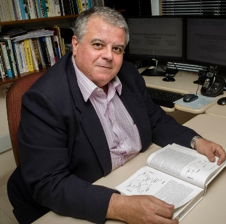Cognitive assistants and intelligent agents
Professor Vicente Julian Inglada
Polytechnic University of Valencia
Abstract:
Cognitive Assistants (CA) are a relatively new concept, advancing the Cognitive Orthotics concept that focuses on direct assistance to people with cognitive or physical disabilities and expanding the area to include complex platforms that include sensors, actuators, interfaces, monitoring abilities, and decision processes. CA is an area containing technologies such as personalized intelligent assistants, multi-agent systems, robotics, e-health applications, and others. This keynote will present several advances made in the area of cognitive assistants from the point of view of intelligent agents.

Full Professor of the Department of Computer Systems and Computing at the Polytechnic University of Valencia (UPV). He is also Deputy Director of Research of the Department of Computer Systems and Computation and Coordinator of the Doctorate Program in Computer Science of the UPV. He belongs to the Valencian Research Institute in Artificial Intelligence (VRAIN). The trajectory in terms of research projects is very regular. He has participated continuously in national and European research projects. His research area is artificial intelligence and, specifically, multi-agent systems. Throughout his scientific career, he has obtained different results in the development of autonomous intelligent systems applied to real-time systems (ARTIS and SIMBA), the coordination of distributed complex services (THOMAS), the development of adaptive virtual organizations (OVAMAH), human-agent coordination, and emotion recognition (iHAS) and, in recent years, in the application of agent technologies to the improvement of mobility especially in the urban environment (SURF and inEDGEmobility). The results obtained have been used in transfer projects related to maritime transport, the simulation of migratory processes, flexible manufacturing in industry 4.0, or the optimization of bike-sharing fleets and the location of electric vehicle charging points. In recent years, he has worked on developing cognitive assistants, obtaining different results in the form of robots or wearable devices mainly focused on improving the well-living of the elderly.
From Ad-hoc to Rapid Reviews: a systematic (and not so rapid) evolution
Professor Guilherme Horta Travassos
Alberto Luiz Coimbra Institute for Graduate Studies and Research in Engineering
Abstract:
Literature reviews used to be the seed of most investigations and research activities. They are usually simple to execute and mostly are performed ad-hoc. However, ad-hoc literature reviews, despite their usefulness to start studies on determining topics of interest, typically present low scientific strength due to a lack of replicability, coverage, and dependability of the researcher´s experience. Therefore, researchers have invested in supporting more systematic literature reviews to minimize bias and provide more reliable findings to support their conclusions. It includes different strategies such as mapping studies, (quasi) Systematic Literature Reviews, and currently, Rapid Reviews. This talk intends to discuss and exemplify these different review strategies and their features in the context of Evidence-Based Software Engineering.

Guilherme Horta Travassos is an Electrical Engineer (UFJF, 1985), M.Sc. (1990) and D.SC. (1994) in Systems and Computer Engineering from COPPE/UFRJ. Held a Post-Doctoral internship at the University of Maryland – College Park together with SEL/NASA (the USA – 98/00), with the main focus on applied experimentation in Software Engineering and software product lines. He is currently a full professor, CNPq researcher, FAPERJ CNE, and head of the Systems and Computer Engineering Graduate Program (PESC) at COPPE/UFRJ. His research interests are inserted in the context of Experimental Software Engineering and in the Engineering of Contemporary Software Systems, including software quality (VV&T), ubiquitous and context-aware systems, Internet of Things, simulation in software, environments, and tools to support software development and experimentation. He leads the Experimental Software Engineering group at COPPE/UFRJ. He is a member of ISERN, the Brazilian Computer Society, and ACM. He is an associate editor of Elsevier-Information and Software Technology. He is part of the editorial board of the other journals. He collaborates with the software industry through research & development projects developed by COPPE /UFRJ. Further information at www.cos.ufrj.br/~ght.
